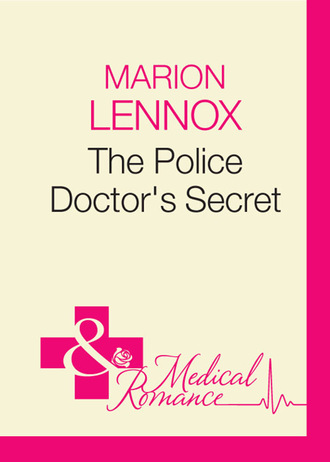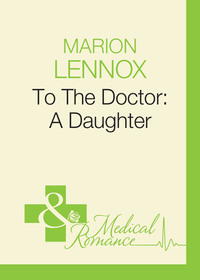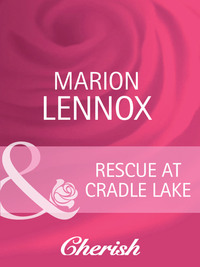
Полная версия
The Police Doctor's Secret
Out on the water there were pelicans flying low—sweeping in to land, then paddling back and forth in elegant sail-pasts, for all the world like organised flotillas of luxury liners. There were currawongs carolling in the jacarandas overhead, and a host of brilliant lorikeets were stripping a brilliant scarlet bougainvillea.
It was…magic.
‘How long have you been here?’ she whispered, her face reflecting her delight.
‘Five years.’ The set look on Alistair’s face should have stopped her right there, but minding her own business had never been Sarah’s strong point. Heaven knew, she’d intended to stay impersonal, but before she could stop herself the question was out.
‘Since your mother died?’
Whoa. Wrong thing to say. It meant all sorts of things. It told Alistair that Sarah had kept tabs—knew what had happened to the old couple after they’d buried their son. Old Doug Benn had suffered a massive stroke only three weeks after Grant died. He’d died almost immediately, and his wife had simply faded until her death twelve months later.
‘As you say.’ Alistair’s anger was palpable. He climbed from the Land Cruiser and she could see it was all he could do not to slam the door. ‘The local policeman—Barry—is out with the searchers. I’ll introduce you to him later. Meanwhile can I show you to your quarters? Do you want dinner?’
‘I want to see the pilot first,’ she told him. ‘I’m here because this case is urgent. Let’s treat it like that.’
‘Fine by me.’
The morgue was at the rear of the hospital, but even the morgue wasn’t an unpleasant place to be. The high windows were open and the sound of the sea pervaded—the wash of surf from around the headland. Smells in morgues were unmistakeable and unavoidable, but the salt air was giving the antiseptic, clinical morgue atmosphere a run for its money.
‘Do you want to change your clothes?’ Alistair asked shortly, and Sarah shook her head.
‘Let me see him first. Then I’ll put on overalls.’
‘Fine.’ They were being scrupulously polite. Alistair cast her a glance that said he still didn’t really believe she was a pathologist, but he walked forward and pulled out the drawer containing the body.
Sarah didn’t move. She’d learned not to.
Her first task was to stand back and get an overall impression. Things were easier that way. If you glanced at someone you got an initial impression that might be superseded later by close examining. But often that impression was right. Age. Background. Where he’d fitted into life.
Jake Condor, his passport said. Aged thirty-eight. That fitted. He looked thirty-eight.
He looked like a schmuck.
He was a pilot, but he didn’t look anything like the pilot she’d just flown with on the way here. He was dressed in blue jeans, with elastic-sided boots that shone with almost astonishing brightness. His jeans were of the far-too-tight variety—designed for maximum impact on the opposite sex. Jeans like that never had the desired effect, Sarah thought, but she knew plenty of guys who wore them. They were the sort of guy who’d try to pick you up and react with total disbelief when turned down.
It was a lot to extrapolate from one pair of jeans, but Sarah was accustomed to forming impressions fast. Sometimes those impressions helped.
What else? A T-shirt with a slogan on it for some Thai beer. Interesting. That T-shirt had definitely come from overseas and it looked new. It fitted with what she’d been told.
The man had tattoos running down arms that were a bit too thin. His arms had been brawny when the tattoos had been applied, she thought. That dragon had definitely shrunk.
He was wearing a Rolex watch. Real? Maybe.
He was wearing something else that caught her attention. She walked around the table to see the leather pouch attached to his belt and glanced back at Alistair. ‘It looks like a gun holster. Was there a gun?’
‘No. We looked. When we saw the holster Barry did a thorough search of the plane, but there was nothing.’
‘You did check the body for bullet holes?’
‘We checked,’ he said wryly. ‘It seemed sensible.’
She nodded, moving on. The man was clean-shaven. Deeply tanned. A bit…oily, she thought. She walked forward and sniffed and was rewarded by the scent of cheap after-shave.
And his hair… His hair was horrid. It was long, black, and curling in oily strands to his shoulders. It looked as if it had been hauled back in a too tight ponytail and then released. Maybe that had happened in the accident?
His hairline was receding. Balding with a ponytail. Not Sarah’s favourite look.
‘He looks like a right Casanova,’ Alistair said, and she glanced up at him again, surprised in a way that he was still here. Work had the capacity to block out all else. It had always been that way and was her saving grace.
A right Casanova. Yeah. ‘You have that impression, too?’
‘He looks a type.’
‘We learn not to make judgements,’ she said, in a voice that was too prim, and she surprised a smile out of him.
‘I thought your job was all about judgements.’
‘In the face of evidence.’ She moved so she could see the man’s face from both sides. ‘That bump didn’t kill him.’
‘I wouldn’t have thought so. He looks like he’s got a broken nose. The guys who reached the plane first wiped him off, trying to see if there was any sign of life, but it’s bled.’
She glanced down at the T-shirt and nodded. The beer slogan was spattered. Okay. He’d been hit on the nose in the crash and then he bled. It meant that he’d still been alive when the plane hit. She looked more closely at the nose. Surely after a bump like that it should have bled more?
It wouldn’t have bled if the heart had stopped pumping. Death must have been fast.
‘Mmm.’ She wasn’t moving him—still simply looking. ‘Is there any damage to the back of his head?’
‘Not that I can see. I had a good look when we put him on the stretcher to bring him in.’
‘And you said there are no needle tracks?’ She was looking closely now at the man’s forearms. Not touching. Just looking. ‘If he was a user he’d have signs.’
‘I didn’t find syringe marks, though they wouldn’t necessarily be obvious if he had only an occasional hit.’
‘That makes less sense. An occasional user taking that amount when he was in control of the plane? He’d have to have been suicidal.’ She stared down at the man on the table and came to a decision. Pushing her curls back from her face, she straightened. Moved right into work mode. ‘Do you have a decent camera?’ she asked. ‘One that can do close-ups?’
‘Yes.’
‘Then can you show me where to change and then fetch the camera while I prepare?’ she asked. ‘I want to go in.’
‘You mean, perform an autopsy? Here?’
‘I know it’s not perfect,’ she told him. ‘I’d far rather take him back to Cairns and do it where I have specialist equipment. But I do know how to do an autopsy without destroying evidence, and if you’re willing to stay present all the time and document as I go then I’ll do it now.’
‘Why?’
‘Because why he died will be tied up with the missing people,’ she told him. ‘It has to be. If there’s injured people missing we may well be running out of time, Alistair. I assume that’s why you called me in instead of sending the body out? I agree. It’s important. So let’s move.’
He gazed at her and she gazed back, unflinching. She was right and he knew it.
There was nothing for it.
He moved.
It had been years since Alistair had performed an autopsy. If there was a coroner’s inquest required, Dolphin Cove’s deceased were generally moved to Cairns for examination, which suited Alistair fine. He didn’t miss the experience one bit. This community was tight knit, the line between patient and friend in this remote place always blurred, and to do an autopsy on a friend was unthinkable.
But back in basic training he’d learned to do them. He knew the rules, which were even more important if there was a hint of foul play. Still, he was more than happy to let Sarah take centre stage. She knew her stuff and, dressed for work, looked every bit the efficient pathologist. Enveloped in white overalls and white rubber boots, with her flaming hair tucked tightly under a surgical cap and her face masked for good measure, she almost wasn’t Sarah.
Only those speaking eyes stayed with him. Alistair operated the camera and took notes as she dictated, moving with Sarah every step of the way, but he was so aware of those eyes…
Where had she learned these skills?
Why had she decided on pathology?
What a waste, he thought suddenly, remembering how he’d first seen her. She’d been at the huge city children’s hospital, where she’d started her paediatric training.
‘Go and say hi to Sarah if you’re in the vicinity,’ Grant had told him. ‘After all, we’re almost family. Or I hope we will be.’
So he had. He’d walked into the ward and seen her on the floor with a toddler. The bed-card—that and the ward he’d entered—had told him the little boy was suffering from leukaemia, a treatable illness in children and with a reasonable cure rate, but the treatment was just plain cruel. The little boy Sarah had been holding was bald and emaciated, and strung up to every conceivable form of tubing and monitor. He’d seemed the sort of child it was impossible to touch without hurting.
But Sarah had been touching. She’d had him in her arms, playing at being a crab. Playing at crawling—slithering over the shiny linoleum of the ward floor. Clutching the little boy in her arms and lying flat on her back, she’d been using her legs not only to manoeuvre the drip stand but to sweep them both around the floor. As they had giggled in tandem, it had been hard to say who was the most delighted—the child or Sarah. The little girl in the next bed had been almost pop-eyed with jealous delight.
Alistair had watched, stunned. Sarah had had no dignity at all. Nor had she cared. Her white pants and surgical coat had gathered dust as she swept the floor but she hadn’t seemed to notice. When she’d looked up and found Alistair looking down at them she’d reacted first with astonishment that he’d looked so like Grant, and then with delight.
‘See, Jonathon? We have an audience. Maybe we can organise a race? What do you say, Dr Benn? Will you be another crab? Choose a crab name immediately. Our crab name is Horace. Kylie’s in the next bed and she needs a crab carriage as well, so bring her down here. Don’t just stand there. Come and race us.’
What could he have said? He’d come to town for a conference, he’d been wearing a suit and tie, but in two minutes she’d had him labelled Henrietta Crab. He’d spent the next half-hour crab-racing, with three-year-old Kylie from the next bed perched on his stomach and close to hysterical with glee.
He’d gone home with aching shoulder muscles, still grinning, and thinking that for once Grant had made a decidedly good call.
That initial impression had deepened.
Grant had brought Sarah home for Christmas that year. She’d spent a week on the farm and she’d made them all laugh. Grant had needed to leave—of course—but Sarah had stayed on and she and Alistair had spent the week helping his elderly father harvest the hay. And at the end of the week Alistair had come close to believing he was in love himself. Dangerously close.
But that had been before. Before…
Don’t think about that, he told himself fiercely. Think instead about why on earth she made the change from paediatrics to pathology.
Maybe it was pathology he needed to focus on.
‘Take a shot of his fingernails,’ she told him. She was lifting the dead man’s hands, inspecting them with care and holding them so he could photograph. ‘There’s nothing here. This guy is a serious groomer. Not only does he slick his hair, he files his nails. I want a photograph of both hands, close up. It’s important to establish that there’s no sign of any struggle. If anyone murdered him they must have done it while he was unconscious. There’s nothing to suggest that sort of injury anywhere.’
She stood back and looked again, still assessing. She’d carefully removed the man’s clothes, and what they had was a five-feet-eight-inch thin male, fussy dresser, clean, well-groomed, tanned above the collar and sleeves but white elsewhere.
‘I’m going to do the autopsy now,’ she told him. ‘You got a strong stomach? You know everything has to be witnessed and double-checked?’
‘I can do it.’
‘Yeah, well get me another witness before you pass out,’ she told him. ‘I don’t want this stuffed for lack of professionalism.’
‘Just do it.’
And fifteen minutes later they had their answer. Sarah was examining the contents of the man’s colon with increasing incredulity.
‘I’ve read about this,’ she said. ‘One of my colleagues found it once and I thought—given the amount of heroin in his blood—it had to be something similar. But to try and fly a plane…’
‘What?’ Alistair said, and she cast him a glance that said she’d almost forgotten he was there.
‘Condoms.’
‘Condoms?’
‘Look. I need these photographed.’ She winced and he could see the look of distaste behind the mask. ‘The man’s a serious twit. He’s come from Thailand, right? Well, he’s come bearing drugs. Drugs are still possible to obtain up in the border areas, only Customs are tight, both here and in the major Thai cities. If he’s caught over there it’s the death penalty, and the jail term here is pretty much equivalent. But the money is amazing. The street value of what we have here is in the tens of thousands. So Jake here has decided to go down a road that many have tried before. He packs condoms with heroin and he swallows them.’
Alistair flinched. He leaned forward and angled the camera, disbelief warring with nausea. ‘How many condoms? The man must have been a lunatic.’
‘It’ll only work if you get rid of them fast,’ Sarah said thoughtfully. ‘The digestive process wears away at the rubber. This guy’s eaten too many for his system to cope with. I’d imagine we’re looking at a constipating of his whole system. So he arrives in the country, maybe worried that he’s not passed them. He’ll be in increasing discomfort, maybe he’ll even give himself a purge—which might well make everything worse as it increases the pressure on the rubber. So he’s flying a small plane with a couple or a few extra people as cargo. Somewhere up there a condom bursts. He suffers a massive overdose, and I mean massive. It’s a miracle he managed to get the plane down at all.’
Alistair nodded, his face grim. As a scenario it was all too plausible—but horrid. He took the photographs they needed and then stood back from the table, trying to take it in. Crime like this—stupidity like this—wasn’t in his ken. ‘Anything else?’ he asked, and she cast him a look that said she knew how badly he was disconcerted.
‘I’ll finish what I’ve started, but we have the answers to our questions. If you can find the local police sergeant for me I’ll make a statement.’
‘But the rest…the other passengers.’
‘I don’t have any answers there. I hope to heaven they haven’t been eating the same diet, but according to you there’s nothing we can do about that tonight. For now…’ She compressed her lips. ‘For now we have as much information as Jake’s going to give us. I’ll finish up here. Then dinner, and test the blood samples when they come in, and then bed. We worry tomorrow.’
Which was just fine, Alistair thought as he watched her work. But…dinner and bed? These were other things to worry about, besides missing drug-runners.
When he’d rung and asked for a forensic pathologist to be flown up he’d made an offer. ‘The accommodation in town’s pretty rough—the pub’s not suitable, especially if whoever you send is female. But there’s a spare bedroom in the doctor’s quarters.’
The doctor’s quarters. His quarters. Dinner and bed might end up being very strained indeed.
It couldn’t be helped. They had missing bodies. Crime. Mystery. Personal drama had to take a back seat.
CHAPTER TWO
THE doctor’s quarters were comfortably furnished and as beautiful as everything else around this place. Sarah was given time to explore them fully. Alistair led her around to the far side of the hospital, ushered her into the spare room, and then excused himself.
‘I have ward rounds to do before dinner,’ he told her. ‘Mrs Granson will have left us a casserole in the oven. If you get hungry before I get back, go ahead. Please.’
She was left in no doubt he’d prefer not to eat with her. Which was fine. That was the way she wanted it, too. Wasn’t it?
Uncertain, though, she took a long shower, soaking off the grime of the plane journey and the memory of the autopsy. Then she hauled on a soft pink leisure suit—a cross between day-dress and pyjamas—and explored Alistair’s domain.
It was simple, but gorgeous. There was one vast living area, with an expansive kitchenette at one end and two bedrooms leading off the other. All the rooms opened out to the beach beyond. The hospital and associated buildings had been built in a vast line, so every room could soak in the sea.
It was still too warm for comfort. The windows, though, were wide open, and the sounds of the sea were everywhere. Sarah prowled around the little apartment, trying to figure out whether to eat or not.
She wasn’t hungry.
She opened the French windows onto the veranda. A small nondescript terrier, black and white, with one leg seemingly weaker than the rest and a big black patch around one eye, roused himself from an ancient settee where he’d been snoozing. He welcomed her with total politeness and then walked definitely into the room she’d just come from—as if to say, Well, you’re welcome, and I’m very grateful that you’re useful. Thank you for opening the door for me.
‘I hope you belong to Alistair,’ Sarah said doubtfully, and then grinned as the little dog stalked straight to the refrigerator and wagged his tail. Okay, he belonged.
But it still didn’t fit. Nothing seemed right about this, she thought, and the long-set-aside confusion came flooding back. Grant would never have been seen dead with a dog like this, and as far as she was concerned Alistair had higher standards than Grant.
But Grant had told her that. And Grant…
Grant had been nothing but a liar.
There was a stack of bookshelves lining the far wall and she turned her attention from the little dog’s pleading eyes—and tail—to the shelves. Alistair lived to read, she remembered Grant saying. She also remembered Grant had teased him about it. ‘I live life,’ he’d told her. ‘Alistair reads about it.’
Yeah, right.
So many things she didn’t understand. So many things she’d got wrong.
She fingered the books and then moved on.
On one shelf there was a photograph in a simple wooden frame. It was all alone, as if the owner of this place didn’t really want any memorabilia but hadn’t been able to resist this one.
It was a photograph of Sheila and Doug Benn. Alistair and Grant’s parents. They’d been at least twenty years older than this when Sarah had met them, she decided, but she still recognised them. They were on a beach somewhere. Dressed in old-fashioned bathing costumes, they stood arm in arm, laughing at the antics of their twin sons.
The twins looked about ten years old.
She could pick them still. They might be identical, but they’d been different even then. Grant would be the one doing the headstand, Sarah thought, looking at the photograph of her ex-fiancé grinning widely at the camera from upside down. Alistair was smiling down at him.
They were all smiling at Grant. That would have pleased him, Sarah thought, picking up the frame and fingering Grant’s face. Grant had always had to be the centre of attention.
‘Will you leave my things alone?’
She nearly dropped the photograph. She hadn’t heard him come in. She whirled and Alistair was standing in the doorway, his face forbidding.
‘I’m…I’m sorry.’
‘I’d imagine you have photos of your own.’
‘I do.’ She put the photograph back on the shelf so fast that it fell face down. Then she had to adjust it, and her colour mounted all the time. ‘I didn’t mean to pry.’
He stared at her for a long moment—but then he shrugged. Whatever he’d wanted to say had clearly been deemed not worth the effort.
‘Okay.’ He took a deep breath and seemed to come to some sort of decision. ‘Look, we’re both stuck with this. Just…we need to keep the whole thing impersonal.’
‘That’s fine by me,’ she managed, and he nodded.
‘Have you eaten?’
‘No.’
‘Why not?’
‘I thought I’d wait for you.’
‘Muriel’s casseroles don’t improve with keeping.’ He crossed to the kitchenette and hauled two plates out of the cupboard to lay them on the bench. Then he looked down to where the little terrier was rubbing himself ecstatically on his ankle. He smiled.
‘How about you, Flotsam?’ he asked the little dog. ‘Has she fed you?’
‘She being the cat’s mother?’ Sarah snapped before she could stop herself, and Alistair’s smile widened. It was a great smile, Sarah thought wistfully. A killer smile.
It would never be directed at her.
‘She said it, not me,’ he told Flotsam. ‘The cat’s mother, eh?’
But Sarah was distracted. ‘Um… Flotsam?’
‘Because of the way I found him. Flotsam and jetsam—washed up on the beach. I haven’t found Jetsam yet, but I guess it’ll happen.’
She was intrigued. This was so far from her preconception of Alistair that she had to probe further. ‘You found him?’
‘You don’t think I’d go out and choose a dog like Flotsam, do you?’ Alistair asked. He was concentrating on lifting the casserole from the oven, and she couldn’t see his face, but she thought he sounded as if he was smiling. That’d make a change.
‘I guess I didn’t think that.’ She stooped and fondled the dog’s scruffy ears, and he reached out a scratchy tongue and licked the back of her hand. He was a seriously enchanting little mutt. No, she hadn’t thought he’d choose a dog like this. But neither had she thought a man like Alistair would have a dog like this foisted on him. Or a man like Grant.
She needed to separate the two. Desperately.
‘So how did you find him?’ she managed.
‘He was washed up after a storm,’ Alistair told her, seeming not to notice her discomfort. ‘There was a cyclone here a few months back. A boat was smashed up on the rocks. Indonesian. A couple of sailors were injured and ended up in hospital. The cargo was fish. We suspect it was taken illegally from Australian waters. Anyway, I walked down to the beach a day after the storm and the smell was unbelievable. Tons and tons of tuna, swept up on the beach and left to rot. Our local fisheries officer was taking photographs as evidence, and while he was photographing a pile of fish, the pile moved.’
‘It moved?’ Sarah was still rubbing the little dog’s ears. Flotsam looked up at her with eyes that said, Oh, isn’t this the most pathetic story—rub me some more! ‘You mean— Flotsam was underneath?’
‘He was crushed under a load of rotten fish. Heaven knows how he managed to survive. At that stage the boat had been broken up for forty-eight hours. Anyway, Flotsam’s leg was badly broken and he was barely alive, but I hauled off a fish and he looked at me…’
‘With his patched eye?’
‘It’s a great eye,’ Alistair said, and there was no doubting the genuine affection in his voice as he looked at the little dog—who was rubbing himself round and round Sarah’s hand so every inch of his scruffy little head was covered. ‘Sam—the fisheries officer—said he was probably an Indonesian dog, was breaking all sorts of immigration laws by being here, and would have to be quarantined for six months if he was to stay. The best thing would be to put him down. But still that crazy eye looked at me. So I went back to the hospital and asked the wounded sailors if they knew him. They all swore they knew nothing about a dog. By the time I returned the eye had worked on Sam as well. So Sam and I declared him officially an Australian dog who’d obviously been walking along the beach minding his own business when two tons of tuna landed on his head.’












